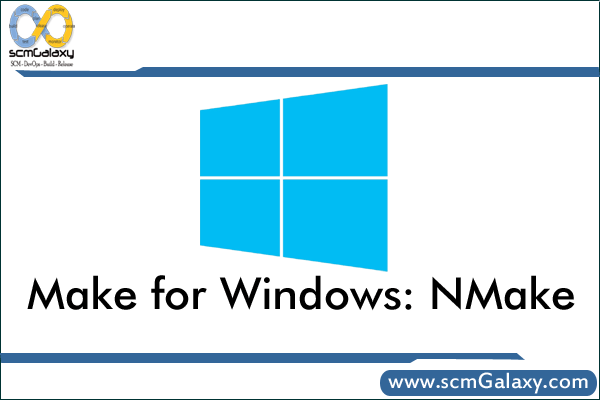

Make for Windows: NMake
What is Nmake?
NMAKE is Microsoft’s implementation of the make tool. The Microsoft Program Maintenance Utility (NMAKE.EXE) is a 32-bit tool that builds projects based on commands contained in a description file.
Another definition found on web as well
nmake is the “make” program for Visual Studio. A “make” program builds (makes) an executable and/or package by reading a set of “make” files. These files are essentially scripts that specify what is to be made, what files (header, source code, resource) are needed for each output file, etc. So nmake can be used to completely automate the process.
A frequently asked question: “Where can I find make for Windows?“. The answer is: “Download and use NMake“.
Downloading NMake
http://support.microsoft.com/default.aspx?scid=kb;en-us;Q132084
Direct Downloan Link of Nmake
http://download.microsoft.com/download/vc15/patch/1.52/w95/en-us/nmake15.exe
Installing NMake
Run the downloaded executable to extract the files. Copy both the NMAKE.EXE and the NMAKE.ERR file to your Perl bin directory, normally C:\Perl\bin. Make sure that you copy the NMAKE.ERR file as well.
1. Download nmake15.exe
2. Double click on nmake15.exe. It will generate 3 files: nmake.exe, nmake.err and readme.txt.
3. Copy nmake.exe and nmake.err to \perl\bin, which is where ActivePerl executable files are located.
4. Now try the nmake command in a command window. If you see the following message, NMake 1.5 is installed correctly:
>nmake
Microsoft (R) Program Maintenance Utility Version 1.50 Copyright (c) Microsoft Corp 1988-94. All rights reserved.
NMAKE : fatal error U1064: MAKEFILE not found and no target specified Stop.
Example of an NMake session
Normally building Perl modules and installing them consist of the following steps:
perl Makefile.pl
make
make test
make install
Reference:
http://msdn.microsoft.com/en-us/library/dd9y37ha%28v=vs.71%29.aspx
I’m a DevOps/SRE/DevSecOps/Cloud Expert passionate about sharing knowledge and experiences. I am working at Cotocus. I blog tech insights at DevOps School, travel stories at Holiday Landmark, stock market tips at Stocks Mantra, health and fitness guidance at My Medic Plus, product reviews at I reviewed , and SEO strategies at Wizbrand.
Do you want to learn Quantum Computing?
Please find my social handles as below;
Rajesh Kumar Personal Website
Rajesh Kumar at YOUTUBE
Rajesh Kumar at INSTAGRAM
Rajesh Kumar at X
Rajesh Kumar at FACEBOOK
Rajesh Kumar at LINKEDIN
Rajesh Kumar at PINTEREST
Rajesh Kumar at QUORA
Rajesh Kumar at WIZBRAND

